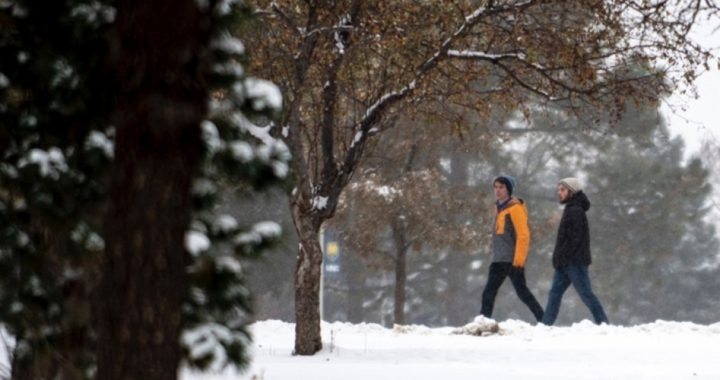
Some unusual mid-autumn weather is again challenging the notion that the Earth is warming, eventually leading to catastrophic climate change. Halloween felt more like mid-January for trick-or-treaters in a large swath of the United States.
According to AccuWeather: “A wave of Arctic air has infiltrated the northern tier of the United States this week, shattering record lows and threatening as many as 70 (other record lows) through Halloween.”
The most extreme example of this cold occurred in Peter Sinks, Utah, which is a natural sink hole at 8,100 feet in elevation in northern Utah. Peter Sinks is considered one of the coldest places in the contiguous United States. But its early Wednesday temperature of -45° F appears to be the coldest temperature ever recorded in October anywhere in the lower 48 states.
On Wednesday, subzero cold reached as far south as the Grand Canyon. In Big Piney, Wyoming, the mercury dropped to -24° F, just before sunrise. High temperatures for Wednesday for much of Colorado, Texas, and the central Plains were 30-50 degrees below normal.
On Tuesday, Denver, Colorado tied a record for the coldest October day on record with the high temperature reaching 18° F. On Halloween, the city broke its record cold temperature for the date with a reading of only 7° F.
Mountainous regions often experience unusual cold early in the year, but this year’s cold isn’t only at high altitudes. Portions of the Upper Midwest were covered with white as an unusual Halloween snowstorm hit the region on Thursday. Between six to nine inches of snow blanketed an area ranging from southern Wisconsin to the lower peninsula of Michigan, breaking numerous snowfall records for the date.
The official snowfall total at Milwaukee’s Mitchell International Airport was 5.8 inches, making 2019 the snowiest October ever in the city. Most Milwaukee suburbs received at least six inches of snow, making for difficult commutes in the region.
Snow also fell in Chicago. The 3.4 inches recorded on October 31 made this year the Windy City’s second snowiest October on record with 4.6 inches total.
The same system is predicted to hit the northeast this weekend with cold temperatures, rain, freezing rain or snow and wind gusts of up to 50 mph.
Does any of this abnormal weather across the United States prove that global warming is not occurring? Of course not. It proves that abnormal weather happens nearly every day somewhere in the world, which is the nature of weather and climate.
But one thing is obvious: extended weather forecasts, while sometimes right on the money, can also be very wrong. The National Oceanic and Atmospheric Administration’s (NOAA) forecast for October of this year turned out to be very wrong.
As Cliff Mass, a professor of atmospheric science at the University of Washington, points out, extended forecasts are often unreliable. “Take this month for example. The official NOAA Climate Prediction Forecasts for October temperatures, made on September 19, was for warmer than normal conditions over the West and MUCH above normal over the southwest U.S.”
“What actually happened? Nearly the entire west was much colder than normal with the northern parts MUCH, MUCH colder than normal. A miss. In fact, a big miss.”
Even the three-to-four week forecast made on October 4 predicted warmer than normal conditions over the western United States. Given this week’s record cold, the prediction couldn’t have been more wrong.
Weather is not the same as climate, the climate hysterics shout. And that’s definitely true. As the NOAA forecast shows, weather is difficult to predict even a month out. Mass points out that weather forecasting reliability drops dramatically as little as two weeks into the future.
With that being the case, how can we possibly reasonably predict climate trends decades in the future?
None of this is to say that we shouldn’t study climate and work to improve long-range weather forecasting, as well as our understanding of climate. But it is reasonable to say that we’ve got a long way to go before we can accurately predict long-term weather or long-term climate trends. We’re simply not there yet, scientifically.
Climate hysterics base their claims of a warmer future Earth based on an incomplete understanding of the planet’s incredibly complex climate system. Their demands for societal change due to climate change are political ones, not scientific ones.
Photo above shows snow on University of Northern Colorado campus in Greeley, Oct. 29, 2019: AP Images




